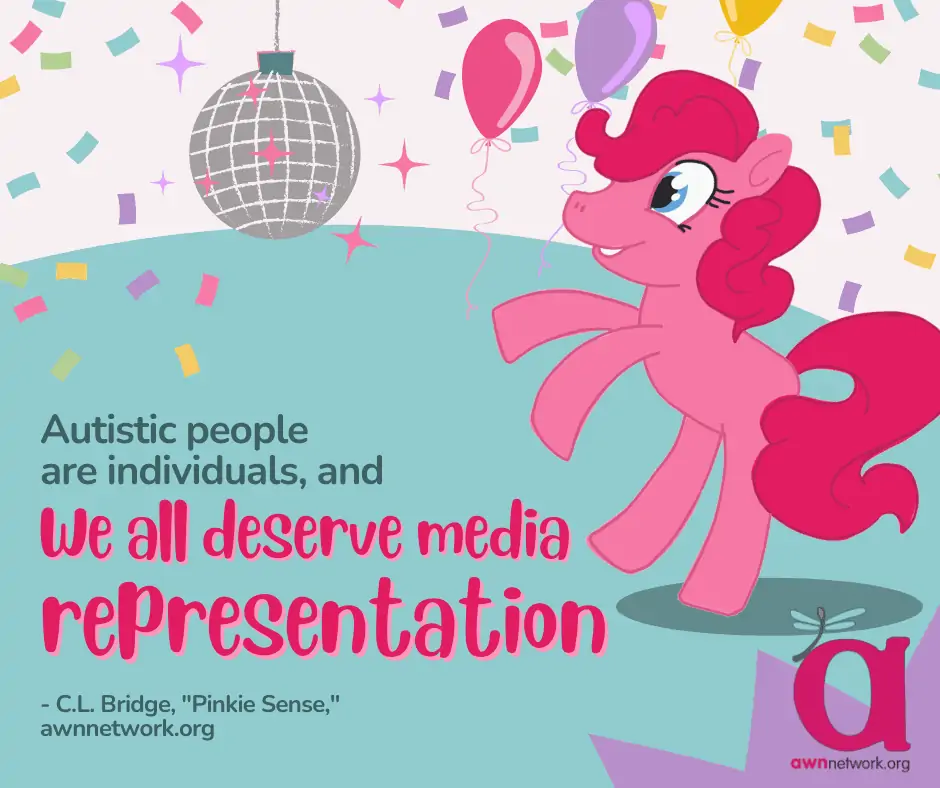
Pinkie Sense: an Autistic Pony Tale
Not all autistic people are withdrawn or shy, although most media portrayals and “signs of autism” lists focus on those who are. We need representation of what autism can look like in a more outgoing person, too. One very extroverted fictional character whom I view as autistic (and probably also ADHD) is Pinkie Pie from My Little Pony: Friendship is Magic.
Pinkie is a sensory seeker. She loves sweets and will eat too much without realizing she’s full. She doesn’t like to sit still, and often gets around by skipping and bouncing. Sometimes she vocal stims by repeating or making up words (“chimicherry, cherrychanga!”). She has an intense interest in parties and jokes, and an uncanny ability to remember other ponies’ birthdays and personal details. It makes sense that a very sociable autistic person (or pony) would develop a special interest in making others smile.
But sometimes Pinkie misses social cues and takes things too far. She may not notice when she’s being too loud, or when another pony needs some space or is embarrassed or annoyed. These traits are apparent when she relentlessly tries to befriend Cranky the donkey and announces to the whole town that he needs a new wig, or when she throws a surprise welcome party for the much more reserved pony Twilight Sparkle.
Like many autistic people, Pinkie can often sense insincerity. When the ponies arrive in a village where everyone has given up their “cutie marks,” Pinkie is the first to realize the villagers’ smiles are fake. She clearly expresses her suspicion of the town, although her friends try to hide their own discomfort. Any autistic person who has been pressured to hide their interests in order to “fit in” can likely relate to Pinkie Pie’s distrust of the town’s conformity.
Pinkie and her older sister Maud are very close, although they seem like opposites. I like to imagine that this is because both are autistic. They may express their emotions very differently from each other, but they also emote differently from most of the ponies around them. As a young foal, Maud would have had “classic” autism traits such as not talking and not using gestures or facial expressions. She would probably have been diagnosed very young. Pinkie, on the other hand, would have been hyperverbal, in-your-face, and awkwardly social. She would have been diagnosed at a later age than Maud because she doesn’t fit the stereotypes most doctors look for.
Many autistic people and people with ADHD have rejection sensitive dysphoria. Pinkie is very sensitive to rejection too. When she thinks her friends don’t like her anymore (it turns out to be a big misunderstanding involving a surprise birthday party) she loses the ability to think rationally, retreats into her imagination, and starts talking to inanimate objects. It takes quite an effort to snap her out of this.
There are several other hints that Pinkie is neurodivergent. Although most ponies Pinkie’s age live on their own, the Cake family looks after Pinkie, giving her a job and a home. Pinkie sometimes takes phrases like “hit the books” literally and gets off topic in conversation. She may start describing her cutie mark and end with “and that’s how Equestria was made!” or start a congratulatory speech for a friend and end up talking about her job at Sugar Cube Corner.
Autistic people are individuals, some quiet and introverted, some bubbly and bold, and some in between. We all deserve media representation, whether or not we fit into a well-known, easily recognized presentation of autism. Although Pinkie is an autistic headcanon, I hope to see canonical autistic characters with a wider variety of personalities in the future.
by C.L. Bridge
